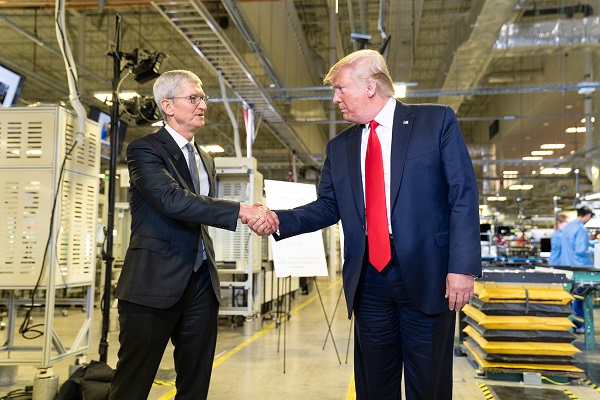Artificial Intelligence
World’s largest AI chip builder Taiwan wants Canadian LNG
Taiwan Semiconductor Manufacturing Company’s campus in Nanjing, China
From the Canadian Energy Centre
Canada inches away from first large-scale LNG exports
The world’s leading producer of semiconductor chips wants access to Canadian energy as demand for artificial intelligence (AI) rapidly advances.
Specifically, Canadian liquefied natural gas (LNG).
The Taiwan Semiconductor Manufacturing Company (TSMC) produces at least 90 per cent of advanced chips in the global market, powering tech giants like Apple and Nvidia.
Taiwanese companies together produce more than 60 per cent of chips used around the world.
That takes a lot of electricity – so much that TSMC alone is on track to consume nearly one-quarter of Taiwan’s energy demand by 2030, according to S&P Global.
“We are coming to the age of AI, and that is consuming more electricity demand than before,” said Harry Tseng, Taiwan’s representative in Canada, in a webcast hosted by Energy for a Secure Future.
According to Taiwan’s Energy Administration, today coal (42 per cent), natural gas (40 per cent), renewables (9.5 per cent) and nuclear (6.3 per cent), primarily supply the country’s electricity.
The government is working to phase out both nuclear energy and coal-fired power.
“We are trying to diversify the sources of power supply. We are looking at Canada and hoping that your natural gas, LNG, can help us,” Tseng said.
Canada is inches away from its first large-scale LNG exports, expected mainly to travel to Asia.
The Coastal GasLink pipeline connecting LNG Canada is now officially in commercial service, and the terminal’s owners are ramping up natural gas production to record rates, according to RBN Energy.
RBN analyst Martin King expects the first shipments to leave LNG Canada by early next year, setting up for commercial operations in mid-2025.
Artificial Intelligence
Apple faces proposed class action over its lag in Apple Intelligence

News release from The Deep View
| Apple, already moving slowly out of the gate on generative AI, has been dealing with a number of roadblocks and mounting delays in its effort to bring a truly AI-enabled Siri to market. The problem, or, one of the problems, is that Apple used these same AI features to heavily promote its latest iPhone, which, as it says on its website, was “built for Apple Intelligence.” |
| Now, the tech giant has been accused of false advertising in a proposed class action lawsuit that argues that Apple’s “pervasive” marketing campaign was “built on a lie.” |
| The details: Apple has — if reluctantly — acknowledged delays on a more advanced Siri, pulling one of the ads that demonstrated the product and adding a disclaimer to its iPhone 16 product page that the feature is “in development and will be available with a future software update.” |
|
| Apple did not respond to a request for comment. |
| The lawsuit was first reported by Axios, and can be read here. |
| This all comes amid an executive shuffling that just took place over at Apple HQ, which put Vision Pro creator Mike Rockwell in charge of the Siri overhaul, according to Bloomberg. |
| Still, shares of Apple rallied to close the day up around 2%, though the stock is still down 12% for the year. |
Artificial Intelligence
Apple bets big on Trump economy with historic $500 billion U.S. investment

Diving Deeper:
Apple’s unprecedented $500 billion investment marks what the company calls “an extraordinary new chapter in the history of American innovation.” The tech giant plans to establish an advanced AI server manufacturing facility near Houston and significantly expand research and development across several key states, including Michigan, Texas, California, and Arizona.
Apple CEO Tim Cook highlighted the company’s confidence in the U.S. economy, stating, “We’re proud to build on our long-standing U.S. investments with this $500 billion commitment to our country’s future.” He noted that the expansion of Apple’s Advanced Manufacturing Fund and investments in cutting-edge technology will further solidify the company’s role in American innovation.
President Trump was quick to highlight Apple’s announcement as a testament to his administration’s economic policies. In a Truth Social post Monday morning, he wrote:
“APPLE HAS JUST ANNOUNCED A RECORD 500 BILLION DOLLAR INVESTMENT IN THE UNITED STATES OF AMERICA. THE REASON, FAITH IN WHAT WE ARE DOING, WITHOUT WHICH, THEY WOULDN’T BE INVESTING TEN CENTS. THANK YOU TIM COOK AND APPLE!!!”
Trump previously hinted at the investment during a White House meeting Friday, revealing that Cook had committed to investing “hundreds of billions of dollars” in the U.S. economy. “That’s what he told me. Now he has to do it,” Trump quipped.
Apple’s expansion will include 20,000 new jobs, with a strong focus on artificial intelligence, silicon engineering, and machine learning. The company also aims to support workforce development through training programs and partnerships with educational institutions.
With Apple’s announcement, the U.S. economy stands to benefit from a major influx of investment into high-tech manufacturing and innovation—further underscoring the tech industry’s continued growth under Trump’s economic agenda.
-

 International2 days ago
International2 days agoPope Francis has died aged 88
-

 International2 days ago
International2 days agoJD Vance was one of the last people to meet Pope Francis
-

 2025 Federal Election1 day ago
2025 Federal Election1 day agoOttawa Confirms China interfering with 2025 federal election: Beijing Seeks to Block Joe Tay’s Election
-

 International2 days ago
International2 days agoPope Francis Dies on Day after Easter
-

 COVID-191 day ago
COVID-191 day agoNearly Half of “COVID-19 Deaths” Were Not Due to COVID-19 – Scientific Reports Journal
-

 2025 Federal Election1 day ago
2025 Federal Election1 day agoHow Canada’s Mainstream Media Lost the Public Trust
-

 Business2 days ago
Business2 days agoCanada Urgently Needs A Watchdog For Government Waste
-

 Energy2 days ago
Energy2 days agoIndigenous-led Projects Hold Key To Canada’s Energy Future






